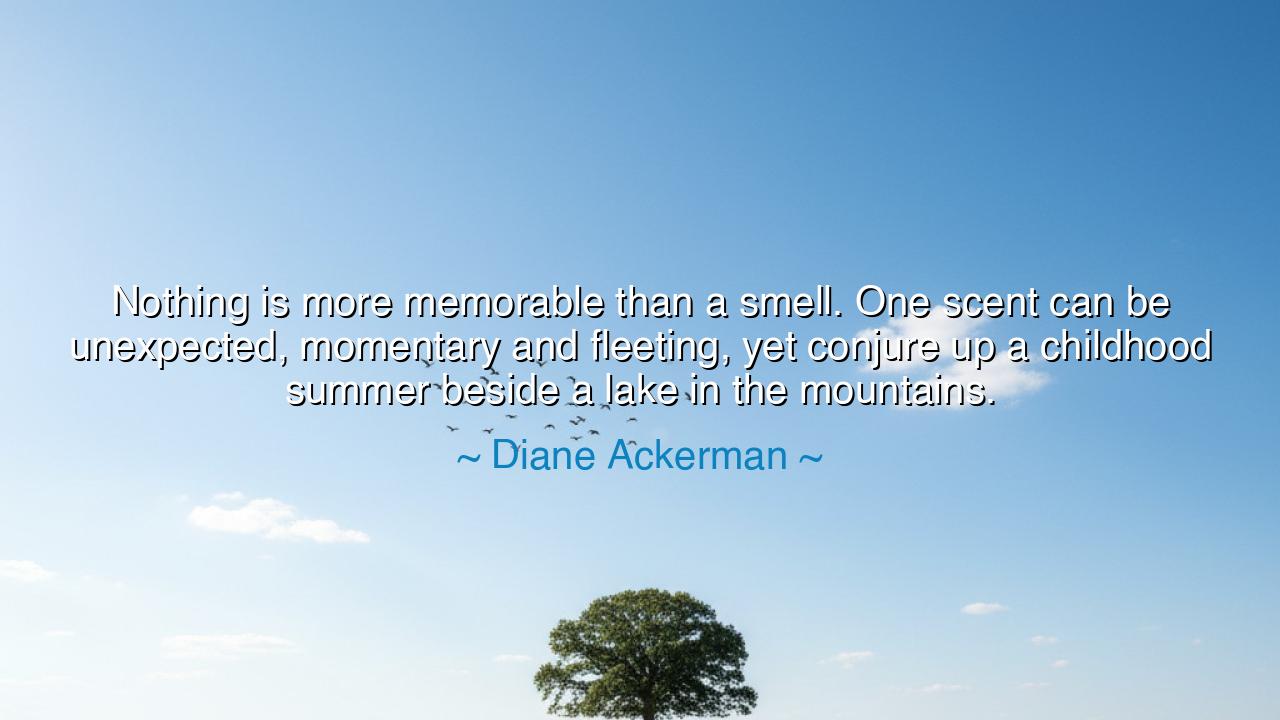
Nothing is more memorable than a smell. One scent can be
Nothing is more memorable than a smell. One scent can be unexpected, momentary and fleeting, yet conjure up a childhood summer beside a lake in the mountains.






Hear, O keepers of memory, the words of Diane Ackerman, who spoke with the tongue of poetry: “Nothing is more memorable than a smell. One scent can be unexpected, momentary and fleeting, yet conjure up a childhood summer beside a lake in the mountains.” These words reveal the hidden gate of remembrance, the doorway by which the past, long buried, leaps forth alive again. For among all the senses, the smell is most ancient, most primal, tied not to reason but to the deep well of the soul.
The origin of this truth lies in the body itself, for the pathways of scent run directly to the regions of memory and emotion. Long before humankind had language or art, the nose was warning of fire, seeking food, savoring flowers, recognizing kin. Thus, when Ackerman speaks of a childhood summer, it is not fancy but science wedded to poetry: the faintest fragrance can summon forth entire worlds. A single breath may bridge decades, bringing to life a place, a face, a forgotten joy.
Consider the tale of Marcel Proust, the writer who, upon tasting a simple madeleine dipped in tea, found himself overwhelmed by memories of childhood. What the eye could not summon, what the ear could not recall, the tongue and the nose awakened in an instant. A scent, fleeting and fragile, opened the floodgates of memory, and from that moment he penned volumes on the inner landscapes of time and recollection. His story is proof of Ackerman’s claim: that smell is the key to the locked chambers of the past.
So too, history is filled with such awakenings. Soldiers returning from war have been known to break into tears at the smell of bread baking, for it recalls to them the hearths of home. Exiles have wept at the scent of the soil of their native land, carried on clothes or hands. Lovers remember each other not only in sight or sound, but in the secret fragrance that lingers like a ghost of intimacy. The scent is fragile, yet it clings to memory with iron strength.
The meaning of Ackerman’s words, then, is this: memory is not stored only in the mind, but in the body, in the senses, in the breath itself. What seems momentary and fleeting is in truth a bridge across time. To recognize this is to understand that our lives are bound by unseen threads—that every flower inhaled, every fire smoked, every perfume carried, may one day return to us with the force of resurrection.
The lesson is both tender and profound: treat the world of scent with reverence. Breathe deeply of your days, for each fragrance you encounter may one day be the vessel of memory. Do not rush past the roses, the sea-wind, the bread from the oven, the woodsmoke at dusk. Take them into yourself, for they are treasures more enduring than gold. When sorrow comes, they may return to you as anchors, reminding you of sweetness once known.
Practical actions flow from this wisdom. Create rituals of scent in your life—an herb you burn in moments of reflection, a flower you plant to mark the seasons, a spice you use when gathering with loved ones. These small things will live on in memory, binding your days together into a fragrant tapestry. And when you are old, a whiff of these same aromas will awaken in you a flood of remembrance, reminding you that your life was full, and your journey rich.
Thus, remember Ackerman’s teaching: “Nothing is more memorable than a smell.” Live as one who honors the perfumes of life, cherishing them as sacred sparks of eternity. For though scent is fleeting, memory is not, and in the breath of a flower, or the smoke of a hearth, the past and present clasp hands, and the soul finds itself whole again.






AAdministratorAdministrator
Welcome, honored guests. Please leave a comment, we will respond soon